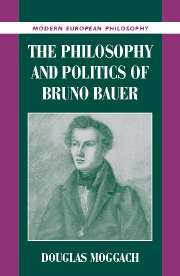Book contents
- Frontmatter
- Contents
- Preface
- THE PHILOSOPHY AND POLITICS OF BRUNO BAUER
- Introduction: “The Friend of Freedom”
- I FOUNDATIONS: AESTHETICS, ETHICS, AND REPUBLICANISM
- II JUDGING THE OLD ORDER
- 3 “The Other of Itself”: The Critique of the Religious Consciousness
- 4 “Revolution and the Republic”: The State and Self-Consciousness
- III THE EMANCIPATORY PROJECT
- IV JUDGING THE REVOLUTIONARY MOVEMENT
- Epilogue: After the Revolution: The Conclusion of the Christian-Germanic Age
- Appendix: Bruno Bauer, “On the Principles of the Beautiful” (1829)
- Notes
- Bibliography
- Index
3 - “The Other of Itself”: The Critique of the Religious Consciousness
Published online by Cambridge University Press: 05 June 2012
- Frontmatter
- Contents
- Preface
- THE PHILOSOPHY AND POLITICS OF BRUNO BAUER
- Introduction: “The Friend of Freedom”
- I FOUNDATIONS: AESTHETICS, ETHICS, AND REPUBLICANISM
- II JUDGING THE OLD ORDER
- 3 “The Other of Itself”: The Critique of the Religious Consciousness
- 4 “Revolution and the Republic”: The State and Self-Consciousness
- III THE EMANCIPATORY PROJECT
- IV JUDGING THE REVOLUTIONARY MOVEMENT
- Epilogue: After the Revolution: The Conclusion of the Christian-Germanic Age
- Appendix: Bruno Bauer, “On the Principles of the Beautiful” (1829)
- Notes
- Bibliography
- Index
Summary
Bauer's 1829 manuscript asserts that faith excludes all doubt, and thus it raises a doubt about the compatibility of religion and philosophy as moments of absolute spirit. The question that preoccupied Bauer throughout the 1830s was the possibility of a rational faith. His intellectual experiments initially seek to establish the unity of thought and being through a speculative account of the doctrines of Christianity (such as the incarnation and the immaculate conception), whose sole justification is to exemplify logical categories. He attempts these reconstructions in the articles he published in Zeitschrift für spekulative Theologie, edited by him between 1836 and 1838, as well as in earlier submissions to Jahrbücher für wissenschaftliche Kritik. The importance of these articles is that they constitute a failed attempt to identify thought and being on the basis of religious representation. Bauer's response to his question of the 1830s is a resounding negative. As Zvi Rosen rightly maintains, “Only lack of knowledge of the source material can explain why certain scholars claim that Bauer suddenly became an atheist after holding orthodox views on religion for years.” In the 1838 Religion of the Old Testament, Bauer's account stresses the subjective basis of religious experience. Unlike the theology of contemporary pietists and of Schleiermacher, this experience is not located in ineffable feelings of dependence on a transcendent absolute, but represents stages in the acquisition of self-consciousness. Religious experiences are differentiated by the subjective conditions of their genesis: A legalistic subordination to an authoritarian deity underlies what Hegel's Phenomenology had defined as the first relationship, a relation of exteriority between God and man.
- Type
- Chapter
- Information
- The Philosophy and Politics of Bruno Bauer , pp. 59 - 79Publisher: Cambridge University PressPrint publication year: 2003

